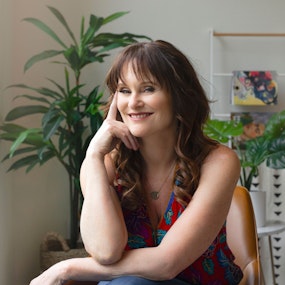From Dog Walker to Multi-Millionaire Female Entrepreneur

How do you travel and run a growing business at the same time? Find out how Kristin Morrison turned a boring dog walking gig into an exciting (and lucrative) business concept. Then, how she was able to move to Bali and keep her business thriving from anywhere in the world.
What does it take to turn a business idea into a multimillion dollar company? How do you travel and run a growing business at the same time? Hear how Kristin Morrison turned a boring dog walking gig into an exciting (and lucrative) business concept. Then, she reveals how she was able to move to Bali and keep her business thriving from anywhere in the world.
Kristin Morrison is a Business and Life Coach, Podcaster, Speaker, and Author who went from accidental business owner to building one of the largest businesses of its kind in California. Now, she lives part-time on 9 acres in the Hawaiian jungle and part-time in Northern California.
Tune in to hear Kristin’s story and discover her tips and advice on staying productive, pricing your services, working less, overcoming burnout, and taking your business to the next level.
Special Offers:
- Buy a copy of Digital Nomads For Dummies
- Going overseas in 2024? Apply for relocation support
- Subscribe to Kristin's weekly e-mail list
Topics Discussed:
- Kristin’s journey from pet sitter to business owner.
- The learning curve of owning a business.
- What to do when you’re anxious and unsure about what you want to do for work.
- How to transform your business to the next level.
- Advice for freelancers and time-based business owners on charging the right prices.
- What to do when you’re struggling with burnout in your business.
- 3 steps to successful delegation.
- How to travel after starting a business.
- Productivity/inspiration tips for digital nomads.
- How Kristin’s life transformed after she started traveling.
- The powerful benefits of solo travel.
- Selling your business and transitioning to a new role.
Questions Answered:
- What is the #1 change your pet sitting clients made to thrive as a business?
- How did you go from working 7 days a week to 3 days a week in just one year?
- When during your entrepreneurial journey did you decide to start traveling?
- Is my business too big to travel?
- How did Bali change your life?
- Why did you sell your business and shift into a coaching role?
- and more!
Episode Resources:
Related Videos:
- How To Become a Digital Nomad: The Top 5 Ways
- How to Create Passive Income & a Location Independent Business - Digital Nomad Interview Matt Bowles
- How to Build an Online Business as a Single Mom w/No Experience with Freya Casey
- BALI DIGITAL NOMADS: Are They Destroying Bali?
Related Podcasts:
- Ep 48: From Virtual Assistant to Founding the Biggest Online Digital Nomad Community in the World
- Ep 180: Making $378K per Year as a Fiverr Freelancer With Alex Fasulo
- Ep 190: How To Find or Become a Virtual Assistant in 2023
- Ep 215: The Easy Way to Live a Better Life
- Ep 223: Slow Travel Tips from Nora Dunn, The Professional Hobo
Books/Articles Mentioned:
Business Management Resources:
- Hire a Virtual Assistant: OnlineJobs.ph, Fiverr, Upwork, GetMagic, ChatterBoss
Connect with Kristin Morrison:
- Visit her website
- Learn more about The Six-Figure Pet Sitting Business Academy
- Follow her on Instagram
- Connect on LinkedIn
- Connect on Facebook
- Listen to Business Pathfinder Podcast
- Listen to Prosperous Pet Business Podcast
Connect with Kristin and Support the Show:
See the show notes pages on BadassDigitalNomads.com or TravelingwithKristin.com/podcast for time stamps, transcripts, and more resources from this episode.
Sneak Peek:
Kristin M: 00:00:00 One of my friends was going to travel around the world for a few months, and I had so much jealousy come up. And what I've since learned about jealousy is it is often a wink from the universe of like, this is something that I am wanting.
Introduction: Welcome to Badass Digital Nomads, where we're pushing the boundaries of remote work and travel, all while staying grounded with a little bit of old school philosophy, self-development, and business advice from our guests.
Kristin: 00:00:38 Hey there, Kristin Wilson from traveling with Kristin here, and welcome to episode 239 of Badass Digital Nomads. My guest today is Kristin Morrison, who became quite well-known across the US and mainstream media for her dog walking company. So she started her company in 1995 and grew it to be one of the largest, uh, dog sitting and dog walking agencies of its kind in California. But as she shares in today's podcast, it was quite a journey to build that business up from nothing. And she struggled a lot with just finding balance between her work and her personal life, and also carving out time to travel. And one of my big takeaways from this conversation is that it's never too late to make a change in your life, whether it's to close a business, sell a business, start a business, or to start traveling and in Kristin's case, even to find a life partner and getting married.
Kristin: 00:01:53 So I hope that you enjoy hearing from Kristin today. She has a very calming and soothing voice and presence, and I really appreciate her opening up and being really real about the struggles that she experienced in her business and also the solutions that she found. And we talk about how you can apply that as a very small business owner or novice freelancer, or if you are more experienced in your business, but you feel like you have those golden handcuffs that are holding you back in your current life, in your current habits, in your current country, and you want to go somewhere else and just get away from it all. And in Kristin's case, that took her to Bali, which really changed her life for the better.
Podcast Interview:
Kristin: Welcome, Kristin to Badass Digital Nomads. It's so nice to have another Kristin here on the show and also with the same exact spelling of the name <laugh>.
Kristin M: 00:02:56 I know. It's so rare. Everybody always wants to put that e in there in my name.
Kristin: 00:03:01 It's the e, yeah.
Kristin M: 00:03:03 I know.
Kristin: 00:03:03 And every time you go into, you know, one of those touristy stores where they sell things with your name on it, I could never find my name <laugh>.
Kristin M: 00:03:11 I know, I know. It's pretty rare. Yeah. And it's such a delight to find another Kristin that spells her name the same way. So, yeah.
Kristin: 00:03:20 Well, uh, where are you joining us from today?
Kristin M: 00:03:24 So I am in, I'm currently in Big Sur, California, and I usually live, I live part-time in Marin County, California, and part-time on the big island of Hawaii. And my husband's family has a retreat house in Big Sur. So that's where I'm at, and it's just incredibly beautiful here. It's a clear, sunny day, a little bit crisp. I'm gonna take my dog to the beach later on. And yeah, it's, it's absolutely stunning here.
Kristin: 00:04:04 I think it's safe to say that you've created an ideal lifestyle for yourself, splitting your time between California and Hawaii, but I know it wasn't always that way. Can you give us a little bit of insight into your background and how you got started on this path of entrepreneurship? Because I read online that you are somewhat of a business mogul for your pet sitting business and then transitioned into helping other people start their pet sitting businesses. So take us back more than 30 years ago and tell us how you got onto this track.
Kristin M: 00:04:42 Yes. So I started walking dogs for a local dog walking company. It was about 30 years ago now, it's hard to believe, but yes, about 30 years ago. And, um, I started wa- walking dogs for this, this company. And a few days into it I realized I think this is what I wanna do. And so I just let it kind of simmer in my brain because I had never been a business owner before, never even had a desire to be a business owner. In fact, I had the opposite feeling that, you know, a lot of people today have about business, which is, I thought of it like stuffy and boring and just not something that I would ever want to do. But when I thought about having a pet business, that filled me with a lot of joy and inspiration. And so about three months in from working with this company, I started my own business.
Kristin: 00:05:51 So was that your first job?
Kristin M: 00:05:53 That was not my first job, but it was my first business. So I had worked a few other jobs. I'd actually worked in a vet hospital, thought I wanted to be a vet, but realized when I was around animals that were injured, that was so hard for me. And,And so, and also eight years of schooling, <laugh> did not feel like it was my path. So even though I had the desire to work with animals very early on when I was a kid, dog walking wasn't a thing then, you know? So it didn't even even enter my mind. But the vet path was clearly not the right fit for me since I was really squeamish about blood. And also it was very hard for me to be around injured animals. And so, yeah, I, I worked at a dentist's office, I waitressed, you know, those are some of the things that I did.
Kristin M: 00:06:53 I went to college, I was trying to figure out what to do with my life and not figuring it out. And at a certain point I realized I needed to let it go, that figuring it out, because my brain wasn't figuring it out, and it was actually creating a lot of anxiety for me. It kept me awake at night. I was afraid that I would be, you know, 70 years old and waiting tables <laugh>. Not that that's a bad thing, you know, but if that's anyone listening, but I just, that, that didn't feel like my path either. But I, since I didn't know what I was going to be doing with my life and, and where I wanted to put my energy, I just kept taking college classes hoping that something would land. It wasn't. But then when I decided to start my pet business, that felt like such a huge yes inside.
Kristin M: 00:07:49 And so I had that business for 18 years, about five years into that business. I, well, I learned a lot, you know, through the process of having that business in terms of hiring, I had never hired people before. So, you know, everything felt new and challenging for me. So I learned a lot of really hard business lessons just through trial and error, reading books. You know, I kind of enrolled myself in my own business school, as I call it. I checked out books from the library, you know, Amazon wasn't a thing then. And, and so I would read books on business and that would be my business school. And I would take what I learned from those books and implement it into my, into my work life. And it really helped. I mean, I felt like being able to learn in the way that worked for me in working in something and learning something that I was then passionate about was very helpful.
Kristin M: 00:08:55 And so, five years in, I got a call from someone, I had my business on the west coast in California, and I got a call from someone in New York, and she was a pet sitter. And she said, I found your pet sitting website online. It looks like you have a really successful company. Would you be willing to coach me? And that was in the year 2000. And I said, yes, I would love to coach you. And so I began coaching her and she began creating, she went from like really struggling financially in her business to creating a very profitable business in a short amount of time in the three months that, you know, I worked with her. She went from really struggling to beginning to thrive in her business and actually having so many clients that she had to turn business away. And she was friends with a lot of pet sitters in New York.
Kristin M: 00:09:55 She lived in New York City. And they, as you know, as you can imagine, you know, pets sitting and dog walking, very big <laugh> in New York City. And she began telling her pet sitters and dog walkers, you know, they asked her like, what happened for you? It, you know, there's so much competition here. How are you doing so well? She said, well, Kristin's my secret weapon. And, and so I began working with all these east coast pet sitters and dog walkers, and they began creating success. And then they began telling their other pet business friends in various parts of the country and then various parts of the world. And within a few years, I had a very successful coaching business for pet sitters, dog walkers, dog trainers, pet groomers. And then a few years after that, I had a number of people that I was working with say, can you please write a book?
Kristin M: 00:10:57 I really want a book that I can read at three in the morning when you're not available for coaching. And you know, I've learned to really listen to my business and listen to my clients and listen to what's needed and actually take action on that. Not just listen, but actually, you know, do the actions that it takes to create what people are asking for. And so I began writing my first book, and that was in 2000, and I believe it was 2010 when I wrote my first book, and that was called Six Figure Pet Sitting. And that book, you know, has sold many, many copies all over the world. And I've since written six books that have been published for pet business owners. And my seventh book was just completed. And that book is coming out in 2024. And that book is for all types of business owners. And so that book will be out fairly soon here. And, um, yeah, so I've done a lot of coaching. I now for all types of business owners. In fact, the podcast that I have is called Business Pathfinder, and it is coaching sessions with business owners who apply to be coached on the podcast. And I've got all types of business owners that I've coached on that podcast. So I now work with, you know, every type of business that you can imagine, <laugh>, including pet sitters and dog walkers. But, you know, yeah.
Kristin: 00:12:38 It's, it's a fascinating path and it actually really mimics what I went through, what I've talked about a lot on, on the podcast and on my website of, of how I didn't know what to do when I quote unquote grew up. And I think for a lot of people that really can relate to feeling that anxiety when you don't know what you should do for work. And it seems like the, the paths that you go down just end up with a closed door. And so you feel like you're spinning your wheels for a while. But I think what you shared shows, and my own experience as well is that if you keep searching and you, and you keep trying things out, then eventually you find something that works. And it might just be something that didn't exist before, like--
Kristin M: Exactly
Kristin: Pet sitting for coaching or helping poker players move to different countries.
Kristin M: Uhhuh. Exactly.
Kristin: You can just make your own thing. Um, so what, what would you say the big number one thing was that your pet sitting clients changed to transform their businesses from barely getting by to thriving? As you mentioned, if, if you're coaching people in different states in different countries, what is the change that you advise them to make to take their business to the next level?
Kristin M: 00:13:57 Yeah, so it sounds very simple and kind of obvious, but it's a change that a lot of business owners in general, not just pet sitters and dog walkers, have a hard time even thinking about or doing. And that is to look at what your current rates are, or if you have products to look at what your current prices are, how long has it been since you've raised your prices, do you need to raise them? Because a lot of business owners have a hard time raising their rates. It can be really confronting, like all of the money beliefs that we have can come and just bite us in the butt, you know, when we're thinking about, I probably should raise my rates, but then what can come is, but I might lose clients. Or if you have products, I might lose sales or not get as many sales as I would like.
Kristin M: 00:14:57 And so that is always, or nearly always, I should say, the first action that I am really looking at with the people that I'm coaching, whatever profession they have is I'm asking the hard questions about rates. So how long has it been since you've raised your rates? If it's been more than a year, what I like to see my coaching clients do is create a competitor analysis in terms of rates to actually show me in their next coaching session what their competitors are charging for the different services or products that they are also offering so that they can begin to compare their prices in terms of their competitors. So for example, let's say I have a pet sitter who is in San Francisco, California. I'm going to be asking them to create a spreadsheet that has at least 10 other competitors in San Francisco and to have the different time amounts in terms of dog walking and pet sitting.
Kristin M: 00:16:10 If there's an additional pet in the home, how much are people charging for that? If there's medication that needs to be administered, how much are people charging for that, their competitors? And so then having them put their rates like smack dab in the middle of that spreadsheet so that they can then see top and bottom where they're at in terms of these prices. And so whenever I have people do this, there is surprise, you know, because it may be that their prices are really high and they need to lower them, but more often than not, and that may be why they're not getting clients, right? If their prices are too high, their pricing themselves out of the market. But if their prices are too low, two things can happen. One is they're gonna have to work very hard to make a lot of money <laugh> or even to get by, right?
Kristin M: 00:17:12 The other thing is, often people who are buying services or even some products are actually not going to trust that service or product. They're gonna think that it's perhaps a poorly made product or, you know, not a great service if it's priced really low. So the opposite can actually happen. A lot of people think, oh, I'm gonna price myself low so I can get lots of clients. But actually what you'll be getting are kind of the bottom feeders, you know, who tend to complain, be challenging to work with, with often clients that are paying the lowest amount are gonna be the ones who are the most demanding, oddly enough. And so it really makes sense, in fact, to be looking at what the prices are in terms of your competitors and what you are charging to see where you need to be. And often what I recommend is, if a business has been in business for let's say five years or more, they're probably gonna wanna be in the top tier of the pricing that they're finding with their competitors online.
Kristin M: 00:18:25 If they're just starting out, let's say they've been in business for a year or two, then maybe they wanna look at being in the middle or even the high middle, right? And so what I do with them in that second coaching session is I'm looking at where's their pricing need to be, and then I'm telling them how to go about raising their rates in a way that isn't going to anger clients <laugh> cause them to leave. I can't guarantee that they're not gonna leave, but I have specific ways of helping people that can limit the amount of mass exodus that can happen when people raise their rates. And, you know, pretty much tried and true because I did it in my own service-based business, you know, almost every year I raised my rates and unless there was a recession or you know, challenges, like after nine 11, I did not raise my rates because it was hard enough getting people, you know, that needed traveling. Like the travel industry basically stopped at that point.
Kristin: 00:19:34 So that, that's definitely something that people struggle with, you know, how to price their services and when to raise rates. But is that really the only thing that, that your clients changed in their business? Because some people might say, you know, I, I can change my rates and it could make some impact, but what I really need is more clients. Or in the case of a dog walking business, this is a really good example because you're exchanging your time for money. And it's like you can only take on so many clients before, you know, you're walking 50,000 steps a day. And it's like, how's that sustainable? Because the next step is to hire more people, which is what you did. And you started outsourcing, which then resulted in burnout. So it's, you've, you've done this for so many decades and you've helped other people do it. So what is your advice to people that are offering a time based business charging hourly rates or per project rates, um, or exchanging their time for money? Like how do they find that sweet spot to where they're making a good living but they're not burning out?
Kristin M: 00:20:46 Yeah. Uh, so I think anytime we can delegate the things that are taking a lot of time and energy is the way to go. When you're starting a new business, especially if you're experiencing some financial challenges and a lot of new brand new business owners experience that, right? Unless they're independently wealthy or they have a, a big nest egg that they can draw on, they don't have the resources for that. So in the beginning, it really is about that business owner learning what to do. And I actually think it's a good idea for a business owner to have as many skills as they can in terms of marketing and growing their business and hiring and all of that. But at a certain point, you are going to be trading time for money. And there is, there are only, as you mentioned, a certain number of hours in a day, there's a certain finite amount of energy that one person has.
Kristin M: 00:21:53 And if you want to have a business and a life, you absolutely must be hiring people to help, whether that be to do the actual services or to do part of the actual services or to assist you, let's say, to hire a virtual assistant. So when I am working with people who are really struggling with burnout, one of the tasks that I have them do is I have them write a list of everything that they do in their business. Currently. That's the first step. Like if you had to write bullet points to hire somebody to do what you do, <laugh>, all the things, what would those bullet points say? And to write them as if they were categories. Okay? And then that's the first step. The second step is to put a star next to the activities that you enjoy. What do you enjoy? And that may be a small number of those.
Kristin M: 00:23:03 And then to circle the ones that you don't enjoy. And those ones that you don't enjoy often are the ones that are most time consuming. So for the listeners out there, <laugh>, if you don't believe me, do this. And you'll be amazed, like the ones that you circle will often be the ones that tend to take the most time. And that may be because you drag your heels to do it because you don't enjoy it. It may be because, because you don't enjoy it, it takes three hours instead of, you know, one hour for a virtual assistant who's just kick ass at doing it. And so that can be the way that you can begin to look at where do you need to delegate? And even if there's just one task that you can begin to delegate to one virtual assistant, let's say, and maybe that's three hours a week, right? You can find a virtual assistant who would be available for that. There are so many virtual assistants out there who would love the opportunity to do the tasks that you don't love to do. And so that would be what I would look at first. And again, it's, it's often the obvious, right? That leads to where we need to go in our life. And so the obvious being raising rates, the obvious being delegate, especially the tasks that are the most time consuming and that you don't enjoy.
Kristin: 00:24:45 Yes. You wrote on your site that there was a point where you had hired over 250 people to work for you, and you had become a successful business owner in the eyes of many people, but not yourself because you are overstretched, you are working too hard, and you, you set a new goal to change the way that you did business so that your business would be highly profitable, but easy and fun to run and also give you time so that you could travel and have more of a life outside of work. And then you gave yourself a deadline of one year to do that. What were the key things that you changed to go from working seven days a week to working three days a week? Was it just delegating some things and and raising your rates? Or what were those changes that you made during that year?
Kristin M: 00:25:41 So that was part of it, but you know, the real key was having a deadline. And I actually like to call it an a live line because it really was this spark of like, okay, I'm giving myself a year. If things don't dramatically improve, I am going to either sell my business or I'm gonna walk away. I was literally working 12 to 14 hours a day in my business, even though I had hired staff to do the pet sitting in dog walking services, I was doing most of the administration work. And you know, I could do that from wherever I was, but it was still very time consuming. So what I began doing is really looking at who amongst my current staff could I hire to be a manager, to begin to have them do these administration tasks that I'm currently doing that are sucking the life energy out of me and that are causing me to fall out of love with my business.
Kristin M: 00:26:49 I mean, I really at that point wanted to divorce my business. It was like a really bad relationship that I was in, like a toxic relationship, right? And so I began looking at my staff members and you know, anytime I'm stuck, my first line of defense is making a list <laugh> similar to, you know, what's the list of bullet points of tasks, you know, same here. So I began, I made a list of all my staff members, and it wasn't that I had 250 people working for me at one time. It was through the course of running my business for 18 years, I'd hired over 250 people to work for me, but at that point I had about 20 staff members that were working for me. And so I made a list of those staff members and I put a star next to the ones that I thought could be a good fit in terms of helping me manage, maybe they would still continue to do some of the pet sitting or dog walking, but they could also perhaps take on some of the administration tasks.
Kristin M: 00:27:53 In addition to that star next to their name, I made a list of the qualities that they had that made me think that they could be a good fit for this job. Because not everybody can be a good fit to be an office liaison, right? A customer service person, somebody that is actually pricing to clients and saying, here's what the rate is, you know, and also scheduling that person. I mean, it really, this type of business, the pet sitting in dog walking industry is really, when you have staff, it's becoming like a matchmaker. You've got a staff member, you've got a client, you've got their location, you've also got the dog's temperament or the cat's temperament, and you've got the staff member's temperament. Are they gonna be a good fit for each other? And so I needed people to be a manager that could actually be a good fit for, you know, being able to do all of those tasks.
Kristin: Basically a psychologist <laugh>
Kristin M: 00:28:56 Yes, in a, in a big way, you know, or intuitive is really important. Having common sense is really important. And that's not, both of those are not skills that you can train a new staff member on, or even an existing staff member on. I mean, you know, you could train someone as a person to have more common sense or to be more intuitive, right? To really listen to that innate sense that speaks sometimes quietly, sometimes loudly. But it's really for what I needed. Like I didn't have a long time to train somebody. I needed people, people that would be skilled to like go in right away. And I felt like them knowing the back end of my business already, them being staff members who dealt with clients in terms of services would be a good fit. And so I ended up finding about five of the out of the 20 that I thought would be a good fit.
Kristin M: 00:30:00 Two of those immediately said, no, they didn't want that responsibility, which was totally fine. But I did have three staff members that were very interested in doing that. And so I ended up training all three. And of those three, two ended up being fantastic managers. One, I ended up just having be an admin person. It turned out the skills that they had weren't a good fit in terms of matching the client, the pet, the home with that staff member, you know, it just wasn't in their skillset. But the other two had that. And so I had them work with me for a while before I began to step away. And for anyone that's delegated, what I found is there are three steps to delegation, which is you, I do. And you watch, okay? So I'm doing the actions that you are going to eventually need to do if you are the person I'm delegating to.
Kristin M: 00:31:09 So I do, and you watch second part, you do, I watch you do it to make sure that you're actually doing it correctly and then you do on your own without me. So three steps. And so I followed that three step process with really good success. And it was through the three step process of delegation that I realized that third person wasn't a good fit for scheduling. You know, I could see that she consistently had challenges figuring out who could be a good fit. And so, but she did have skills at customer service. And so she was able to return client calls to answer client emails and really be a great communicator in that way. And so she was valuable for that, but she couldn't do all of the things that I was doing, but the other two managers could. And so as I began to transition from the you do and I watch you do it to you do, and they were doing a great job, that's when I began to step away.
Kristin M: 00:32:21 And it was probably like between month six and month eighth of that one year period. And then by the end of the year, I had had those managers, the three managers, granted one was not scheduling, but they began splitting the four days that I was not working amongst themselves. And we had a schedule so that, you know, they were working the four days, I was working three days a week. The three days of my choice were Tuesday, Wednesday, Thursday, and then I did not work Friday, Saturday, Sunday, Monday at all. And it was very weird for me initially, very odd. I had been working so hard for so long. Uh, but what had happened was in those three days, I was so laser focused because I had so much rest. And I actually felt so fired up during that time that I was responding to clients quickly.
Kristin M: 00:33:33 I was lit up, I was passionate, I was able to sell clients on our service in ways that I hadn't been before because I had been exhausted. And so, you know, and also I had energy to market our business and to hire even more people. And so that's how I was able to really go from, you know, working seven days a week, totally exhausted and not making very much money after all was said and done for all that hard work to going from, you know, seven days a week to working three days a week and having a sane and wonderful lifestyle and making double the amount of profit. I mean, it sounds very clickbait, <laugh>, but it wasn't like it was a strategy that worked.
Kristin: 00:34:27 Well. There's a lot to unpack there, but I think that the main points that listeners can apply in their own life and business, even if you're not working, because even if you are retired or living on passive income, there's still a lot of tasks and things that come up. Just being an adult in the world today, there's a lot to do.
Kristin M: Oh, yes, true.
Kristin: So I really like the first tip about creating a list of everything that you do. This is something that a coach had me do back in 2021, and I still use it to this day. So just creating a list of all of the things that you do, like a brain dump, and then putting a star next to the things that you like to do, circling the things that you wanna delegate, and then also putting an X and eliminating the things that you just don't want to be a part of your business anymore at all.
Kristin: 00:35:22 Like things that you want to delete from your world that can kind of come up ad hoc as you grow as a person and as you grow in your business, there can be additional tasks or things that come up that, that weren't intentional, but end up taking up a lot of time. And then not everyone will have, you know, a team of 20 people where they can hire from within and delegate, or even have the budget to hire a full-time manager. But what I would recommend to anyone who's in an earlier phase of the business is just to refer back to that list and hire a virtual assistant for, you know, the big things that are really draining your time and your energy, but not contributing to the bottom line of your business. And we actually have a podcast on, on hiring virtual assistants and becoming a virtual assistant.
Kristin: 00:36:18 But you can find virtual assistants through some of the virtual assistant marketplaces, like even related to certain countries, like OnlineJobs.ph. But you can also find hourly and contract virtual assistants through Fiverr and Upwork. And then there's also agencies now like Get Magic comes to mind. ChatterBoss comes to mind that you can hire a VA. And, and I also recommend starting small with that, because I've also been in a position where I had hired too many people.
Kristin M: Yep.
Kristin: And everyone was doing different things, and then there was no profit leftover for me. <laugh>. So.
Kristin M: 00:36:59 Yeah. Exactly. And it can become too many cooks in the kitchen too. Right?
Kristin: 00:37:02 Exactly. Yeah. Especially when I was writing my book, I just delegated everything and then yeah, my expenses quadrupled. And I was like, what's the point? So you wanna just delegate thoughtfully and, and eventually you can get to a position where you might not want to scale your business. You might not wanna hire 10 people or 20 people. You might just want to be a sole proprietor and you know, have that work life balance. So at what point during your, your business journey did you decide to leave California and start traveling? Because you mentioned to me that you lived in India and you traveled around while you were working, you lived in Bali. So how were you able to do that? Was this after the point where you began delegating everything?
Kristin M: 00:37:55 So yeah, it was after I had hired my managers. They had been managing for maybe two years. And I was, my regular schedule was Tuesday, Wednesday, Thursday. So I was working three days a week. I had that solidly under my belt, right? It was like, okay, I'm in the flow now. And I had fallen in love with my business again. It was like renewing the vows, you know, my business, if my business was a marriage, it was like, yes, I will say yes to you again. So there was a point where one of my friends was going to travel around the world for a few months, and I had so much jealousy come up and it like hit me like a tidal wave. Like from out of nowhere, she was telling me about this upcoming trip she was taking. She was super excited. She was gonna be backpacking around the world, and I was just completely green with envy.
Kristin M: 00:39:04 And I didn't share that with her. But I went home, we had gone out to eat lunch at a restaurant. I came home and I just began writing in my journal about the jealousy and why was it there? Like what was it there to teach me? And what I've since learned about jealousy is it's often a wink from the universe of like, this is something that I am wanting. It may be a buried dream that I have been reluctant to uncover. It may be something that wants to be born within me, a new way of living. And what I realized is I had done a lot of travel in my early twenties, and I really missed it. In fact, every time I saw my backpack in the shed on my property, I would feel a wave of sadness. But I would push it down like, you know, you're an adult now.
Kristin M: 00:40:10 You know, kind of that kind of thing. Like, you know, let that go. That's an old dream. You know, you, you have a business, you have an amazing life. You know, like talk myself down off the ledge basically, of that sadness. But it was still there. And so I began really untangling it and realizing that was a dream that I had had, but I had this belief, and that was kind of what was keeping that desire and that dream from coming to the surface. And that belief was that my business was too big for me to travel for months at a time in another country. Like, what if bad things happened in my business, which they did periodically. You know, I was dealing with a lot of pets and homes and people, and <laugh>, you know, it's a numbers game. Like it was only a matter of time before things typically did happen.
Kristin M: 00:41:07 You know, I had to put out fires. But, so it was like, well, my business is too big, you know, I have a huge business. I can't travel. That would be irresponsible. You know? So I began early talking back to those voices in my head that were the no voices, that were the real critical voices that were keeping that dream from coming to the surface. And I began really looking at the what if, you know, the, I began letting that voice of possibility come out. Like, what if I could travel and feeling that excitement bubble up, right? And listening to that and really realizing, wow, that is potent. Like it wants to come forward. And so I began looking at that belief of, my business is too big. And it's like, well, is that true? You know, there are lots of people who have big businesses. I don't know any personally, but I'm imagining that there are lots of people who have big businesses that travel for months at a time. Why can't I?
Kristin: 00:42:23 And it would also work the other way around. You know what if, if you have a small business, you might think, well, my business is too small to travel.
Kristin M: 00:42:32 Exactly. I'm not making enough money to travel. Right? Exactly. I love that you brought that up, because that definitely, I work with a lot of people who are dealing with those small business critical voices, right? Or, you know, small amount of earning voices. And so it's just important to have a conversation with a wise inner part of ourselves that can talk to that part that is negative, that is afraid, that is really wanting to keep us safe and protected, right? <laugh> and maybe not let that dream come forward. And so, going back to me, and what I began doing is my business is too big to travel. That was the belief that I had. And so I had to look at, is that true? Yes, it's true that my business is big, but is it too big for me to travel? No. So what if my business was the perfect size for me to travel?
Kristin M: 00:43:48 It's kind of like when I was really looking at the negative beliefs around, you know, I wanted to get married. And I felt like at that point I was too old to find my husband, you know, it was like, oh, that ship is sailed, kind of thing. You know, <laugh>. But what if, what if I'm the perfect age to get married? And it was shortly after that that I met the man who is now my husband. You know? So there is power in working with these negative beliefs. Like if we, we create the life that we believe we can have. And so if your belief is that you can't travel and have a business, you are going to be creating that life where you can't travel. But sometimes all that needs to happen, like the beginning can be just opening that box, Pandora's box, right?
Kristin M: 00:44:46 Of like, what if I'm the, my business is the perfect size for me to travel. I have these managers who can help me. And so I began kind of teasing that out and really looking at, oh, maybe I can do this. I was a stand for the voice of possibility. And so one day I decided to ask my managers if they would be willing to manage my business for two or three months while I made my first trip. You know, what I thought might be my first trip of many. And oh, I was terrified, Kristin. I was like, what if they say no, you know? Well, if they say no, then I need to do this. I'm actually gonna have to find someone that can manage my business so that, you know, it wasn't the end of a dream. I wasn't putting my dream in the hands of these two people that, you know, if they say, no, forget it. Then it was like, okay, then I'm gonna have to hire somebody else.
Kristin: 00:45:56 Or just find a way to automate certain things and shift the times that you worked so that you could work and travel at the same time, which is what a lot of us do.
Kristin M: 00:46:08 That's true. But for me, I knew that I wanted to go to Bali, which was the direct opposite of my clients in the states
Kristin: 00:46:16 Time zones.
Kristin M: 00:46:17 Yeah. And I also know this about myself, and I think it's important for digital nomads to know about themselves. Like what are their power hours? Right? When are they most alive and energized? And for me, you know, I can do some nighttime hours. I, you know, I'm kind of a night owl. What I'm not is a morning person at all. That is not my jam. In fact, I really suck in the morning. Like, you know, trying to get energized in the morning is not something I can do. So in terms of the US hours, I knew that really if I was gonna do this, this is for me, maybe not for some of the people that are listening, but for me, I knew that I needed to have somebody in the states who could really manage my business during our scheduled office hours, which were when clients expected return calls, return emails. And if I didn't have that, I was gonna need to hire somebody that could do that. You know, I could do some of it when I was away, but really what I wanted was to be completely free.
Kristin: 00:47:32 You wanted a sabbatical?
Kristin M: 00:47:34 I did. That's exactly right. I wanted a sabbatical. And so I asked my managers and I kind of held my breath, you know, after I asked them. And I did separate phone calls, you know, I scheduled phone calls with them and each of them said, yes. And what I did <laugh>. So there's power for me in having that deadline, aka a live line, right? So what I immediately did after they both said yes, is I booked a ticket for nine months from that date, and it was a non-refundable ticket to Bali.
Kristin: 00:48:19 So you set a deadline, which is something that I always recommend.
Kristin M: 00:48:23 Yes, Yes. And I began to actively train my managers to do those remaining tasks that were only tasks that I was up until then doing on those three days that I was working, which is I needed them to know how to hire people if there needed to be hiring that happened. 'cause up until then, I had always been the person who hired the pet sitters and dog walkers. And so, you know, and that was a skill that takes a bit of time to be able to hire or to learn, right? And so I began teaching them that skill and also invoicing. Up until then, I was the one who was responsible for billing clients, for depositing money in the account, for moving the money around, for bill paying. Like I said, I didn't wanna do anything while I was gone. And so I gave my main manager power of attorney so that she was able to deal with things in the states, both personally and professionally while I was away. And I would never recommend that personally, unless it's somebody that you absolutely trust, because they can do anything, you know? I mean, you can give them a ta you know, a list of tasks that they can do that are only the things that they can do. But if you give them the broad power of attorney, they can literally do anything in your absence. And it is weighty <laugh>.
Kristin: 00:50:03 Yes. That's definitely a big decision to give someone power of attorney. You wanna make sure that you're giving it to someone that you trust and also that you're keeping tabs and following up with anything they might need to use it for.
Kristin M: That's right.
Kristin: But there's three things I really wanna highlight from what you said there. I think the first is that jealousy is a map, or jealousy is a clue, or jealousy is a spotlight on something that you want to do. Jealousy is not something to be ashamed of or afraid of. If you feel that I learned this through reading the book The Artist's Way,
Kristin M: Yes.
Kristin: Where the author talks about using jealousy as, as a map or a clue to something that you wanna do. So if you find yourself feeling, you know, feelings of envy over some Instagram posts you saw, or some lifestyle that someone else is, is living whether it's related to travel or business, then ask yourself, you know, what about that appeals to me?
Kristin: 00:51:05 And that can be a hint or a clue and a direction to go in. So I, I like that you felt that, but then you didn't just stuff those feelings down and be angry and bitter about it, but you actually thought, well, how can I do that in my life? How can I add more travel to my life? How can I live in Bali <laugh>, uh, for nine months and, and took action towards that?
Kristin M: Yes, exactly.
Kristin: Um, the other thing is, you know, that you went back to your, your list of things that you know, you could delegate and then took the steps to do that. And, and you had that curiosity as well to challenge your, your limiting beliefs. I think curiosity is a very underrated and underutilized technique where you ask, what if, you know, what if this were possible, what would I do?
Kristin: 00:51:57 Or what if I had enough money already to travel? Or what if I had enough expertise to start this business or offer this service? Or what if I didn't have to wait until I'm retired to start traveling? Or any anything that you feel is holding you back, any sort of limiting belief. You know, what, if I'm not too old to get married, uh, you know, I, it can apply to anything. And what would that look like? And that you can come up with a lot of really interesting ideas from your subconscious for that. And then an additional technique I would add, there is something that Tim Ferriss has talked a lot about called Fear Setting, where you basically think about the worst case scenario and how you would solve that. So, you know, what if your business failed or, or what if you ran out of money or what if you know, anything that, that you are worried about, you can make a list of, these are all the things that I'm worried about, you know, the world ending, if I take this step to achieve my dreams.
Kristin: 00:53:04 And then you can go to each one and you can write potential solutions knowing that 99% of the things that you write down are actually quite unlikely to happen. But, you know, worst case scenario, you're in Bali, you run out of money, you have to close your business or something like that. You know, you could fly home, you could live off your savings for a few months. You could apply for a job, you could, you know, there's all of these other things that you could do. So those would be some techniques I would, for people that are in a similar situation where they feel like they're not really sure what is the next step to take. Um, but then I'm also curious as to, you know, your experience in Bali once you got there, how long did you spend in Bali and how did that change your life moving forward when you came back?
Kristin M: 00:53:58 Yeah, it was transformational for sure. So I arrived in Bali, and I hadn't been to Bali since the late, or I guess maybe early nineties. So I was shocked at how Ubud, which is where I, how stayed years before, how that had changed. And initially I was so disappointed because it was, it was a city and Eat, Pray, Love had, you know, that book had come out. So it had really impacted Ubud, which is where, um, the author stayed and wrote about the healers and all of that. And so it just really was sad to me. And I actually thought about that I was gonna leave or, or go to another part of Bali rather than Ubud. But I gave it some time. I gave it like a week. And what I realized is that what brought me to Bali that first time was just total and utter magic <laugh>.
Kristin M: 00:55:10 And I say that in the most powerful sense of the word. I mean, it is so amazing to be there. And also the Balinese people are so beautiful. And yeah, it's just, it's incredible. So long story short, I stayed in Ubud and really fell in love with it. And then I ended up going to India for a little while, then coming back to Bali. And before I left Bali, I actually contacted my managers and said, I wanna come back in a few months. Would you be willing to manage for, you know, seven or eight months so that I can stay in Bali for a long period of time? And they said yes. And so that was really comforting for me. While I was in Bali, I worked with a number of healers and just did a lot of deep, deep inner work that I feel like really cleared out a lot of the debris that was keeping my life stuck.
Kristin M: 00:56:18 You know, I had done a lot before that, but one of my biggest blocks was really wanting to be married, as I mentioned a bit ago. And, you know, I'd had a lot of really challenging relationships, been with unavailable men, and in fact was with an unavailable man. You know, when I was in Ubud, I met someone and it was kind of like the last hurrah of unavailable, man. I just went, I'm done. And so I just, I did a lot of deep and profound work and ended up really clearing out a lot, you know, of, of gunk that was standing in my way relationally. And when I came back from my second time in Bali, you know, that's when I realized that belief around, you know, I'm too old to get married, but what if I'm the perfect age to get married? And I met my now husband shortly after that. So I really attribute clearing the way from being in Bali and really doing a lot of work, inner work, and having time to do that inner work, such a gift.
Kristin: 00:57:26 Do you feel like you could have gotten that perspective and that healing and that time had you stayed in California? Or was there something about leaving your physical location that made the difference?
Kristin M: 00:57:37 Yep. There was something about that. And I traveled alone. And I think there's power in that too. Like really being open and available for what life wants to reveal, you know, in those locations, you know, as part of that journey and having to depend on myself, you know, being outta my comfort zone, like all of that really created this openness and awareness and willingness to really unfold, you know, allow life to have its way with me. So powerful.
Kristin: 00:58:14 And ultimately, so you went on this journey with your, your business and your personal life as well, growing the business, delegating things in the business, but then ultimately deciding to sell the business to shift into more of a coaching role. Did that decision come as well from your time spent in Bali?
Kristin M: 00:58:35 That's so good. I mean, you're really, you're a great interviewer, Kristin, just so you know.
Kristin: Thank you. Yeah.
Kristin M: You're, I mean, your questions are very intuitive. Yes, exactly. That. You know, I came back from that second time in Bali really realizing that my business was an old coat that I no longer wanted to wear and have around me. And, you know, my brain was like, but you are making all this passive income from it, and you're only working at that point. I, I came back and I was only working two days a week in it, and it was cushy. It was like a cushy life in a lot of ways. I had, you know, really worked out a lot of the kinks. There weren't a lot of fires to put out at that point. And it was like, even so it was an old part of me that was weighing me down, you know, even when I wasn't working, it was still very much a part of me and I was ultimately the responsible one if something happened and I wanted to let that responsibility go.
Kristin M: 00:59:42 And it's funny because shortly after I came back from that second trip in Bali and I was thinking about selling it, and I told a friend, I said, I think I wanna sell my business. I said, do not tell anyone that, you know, because one of the key principles when you're thinking about selling a business is you keep it a secret until it's actually sold. Because it can be really detrimental to the business, the health of the business, if you tell people and word gets out before it gets sold. And so literally the next day I got a call from a business broker who said, are you interested in selling your business <laugh>? And I said, why did Blankety Blank tell you? And he's like, what? Nobody told me. I'm just cold calling businesses, you know? And I said, what? It was so bizarre. I'd never gotten a call like that. And he ended up being my business broker. And um, I sold my business shortly after that.
Kristin: 01:00:47 Wow. Yeah. It was all meant to be, I guess everything happens for a reason. <laugh>.
Kristin M: 01:00:53 Yeah, It really was. And I feel also like letting my business go, selling it was instrumental in me having space to be in a marriage. You know, so I met my husband and then I sold my business three months later after that. And I just feel like I wasn't, like my business was kind of my partner in life and had been, it had been my primary partner. And not that everybody needs to sell their business in order to get married or, you know, make more space in their life or their loved ones, but for me, that was something that was really important for me to do in order to move forward in my life and also for all the parts of my business that I really wanted to put energy into, which was really helping all types of business owners create meaningful success and wild success in their business and in their life.
Kristin: 01:01:57 Well it seems like everything comes full circle and you're now helping people who are in the position that you might've been in 30 years ago, um, or 20 years ago. So it's a beautiful thing. Well, thank you so much, Kristin, for sharing all of your wisdom with us on the show today. And where can people connect with you to both listen to your podcast and those coaching sessions that you mentioned, as well as to connect with you for potential support in, in building or growing their businesses?
Kristin M: 01:02:32 Yeah, so my website is Kristinmorrison.com and that's with two I's in Kristin, like you have Kristin Wilson. So it's Kristinmorrison.com and you can find information about my private one-on-one coaching my, I do something called Best Year Yet coaching, which is I help people create the best year they've ever had in their business and in their life. And I also do VIP coaching days in either Hawaii or in Northern California. So you could combine a vacation in one of those destinations with a full day of private coaching with me. Um, and my podcast is called Business Pathfinder. Again, it's live coaching sessions that I do with business owners who apply to be coached on the podcast. And that is on all the apps. Um, it's Business Pathfinder, and you can also find it on my website, Kristin Morrison. I'm on Instagram at Coach Kristin Morrison. I also have another podcast for pet business owners. If anybody out there is thinking about starting a pet business or you know, has a pet business. And that is called Prosperous Pet Business. And I have six sixfigurepetbusinessacademy.com, which is to help people create a successful pet business.
Kristin: 01:04:01 Great. I know we have a lot of pet sitters, dog walkers or aspiring pet sit sitters and house sitters out there. So we'll definitely link to all of those resources in the show notes and hope to cross paths in Hawaii or Big Sur. Sounds good to me. <laugh>, let's make it happen.
Kristin M: 01:04:20 I would love it. I'd love to meet you in person, Kristin, it would be great.
Kristin: 01:04:25 Thank you for spending time with Kristin and I today on the podcast. I hope that our conversation gave you a few tips and ideas that you can apply in your life and business, whether it was what we talked about, creating a list of tasks that you do so that you can focus on what you love to do the most and delegate or eliminate the things that you don't like as much. Or even just getting some inspiration to set up a trip, to book a date, to set a deadline or an a live line as she mentioned it, for a timeline for when you want to travel by and maybe even buy a non-refundable round trip ticket like she did, and then work backwards from there to ask yourself, you know, what, what if, you know, what would you need to do if you were to do X, Y, Z by such and such a date?
Kristin: 01:05:27 So what would need to happen if you want to quit your job in the next nine months to a year? Or what would happen if one year from now you wanted to be living in Bali or Portugal or Thailand or Spain, or even something sooner? You know, what would need to happen if you wanted to go on a trip in the next three to six months, or if you wanted to downsize some belongings and free up some time and money for you to be able to go remote for a little while, even if it's just for one month, uh, traveling in another country, or maybe you found some inspiration to take a very physical and geographically demanding job like being a dog walker or a dog sitter and transforming that type of job that you have into something that you can do from anywhere. So I hope you got a lot of ideas from our conversation today, and I also hope that you had a very Merry Christmas if you celebrate Christmas yesterday and that you're having a wonderful holiday season and end to the year. And yes, again, this conversation gave you a lot of ideas for some goals to set or dreams that you want to achieve in 2024, and I look forward to seeing you back here again next week.

Kristin Morrison
Holistic Business Coach, Author, Podcast Host
Kristin Morrison started her first business in 1995 and grew it to be one of the largest of its kind in California. She lived abroad while her business ran under the care of her managers and gave herself the gift of both time and money! She now lives part-time on 9 acres in the jungle in Hawaii and part-time in Northern California.
































































